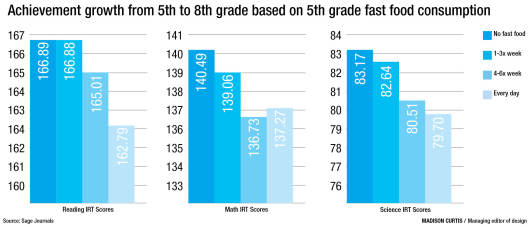Fast food might not be good for the waistline, and researchers are now finding that it might also be harmful to the brain.
Students who consumed more fast food in the fifth grade were more likely to score lower on tests in reading, math and science in the eighth grade, according to a study by Kelly Purtell, an assistant professor of human sciences at Ohio State.
Purtell conducted the study in association with Elizabeth Gershoff, a professor of human development and family sciences at the University of Texas at Austin.
In the study, Purtell and Gershoff measured the academic abilities of students by comparing achievement tests taken by the students in the fifth grade to achievement tests taken by the same students in eighth grade.
The study, which included about 11,740 students, were tested in the subjects of reading/literacy, mathematics and science in both fifth and eighth grades. The students were also asked to complete a fast food consumption survey in fifth grade.
“Our findings suggest there is a link between the food children eat and how they are learning in school, with worse food inputs linked with worse achievement gains,” Gershoff said.
According to the study, less than a third of the children said they had not eaten fast food during the week before they completed the questionnaire. Ten percent said they ate fast food every day and another 10 percent said they ate fast food four to six times a week. A little more than half of the children said they ate fast food one to three times in the previous week.
“Our results showed that fast food consumption, especially frequent consumption, predicted lower academic growth in all three subjects,” Purtell said.
Purtell said “frequent consumption” meant that the children ate fast food more than four times a week, and that students who ate the most fast food had test score gains that were about 20 percent lower than non-fast-food-eaters.
Although the children who frequently ate fast food had lower academic growth compared to non-eaters in all three achievement areas, children who only ate fast food one to three times a week only scored lower compared to non-eaters in the subject of mathematics, the study said.
The study also examined other possible influences on students’ test scores, such as the amount of time the children spent exercising each day, the amount of television they watched each day, what other food the children ate, the family’s socioeconomic status and the characteristics of the children’s neighborhoods.
However, despite taking these factors into account, the results remained, which Gershoff said supported the argument that a diet consisting of fast food impacts both the physical and mental well-being of students.
“My colleague Kelly Purtell and I were interested in whether fast food has impacts on children beyond their physical health and obesity,” she said. “There has been a steep increase in how often children eat fast food in the last few decades, but very little research on how this large change in children’s daily habits might affect how well they do in school.”
Purtell said the study does not prove that fast food consumption causes lower academic growth, but she wants to continue her research.
“I think that we need to understand more about the food children are consuming and why children are eating what they’re eating,” she said. “We need to know more about why these patterns show up.”
Purtell said the results of the study are applicable to college students, but there has not been any research conducted yet with adult subjects.
“We don’t know exactly how fast food impacts adults quite yet,” Purtell said.
Gerhoff said she hopes that the study encourages students to make conscious healthy eating choices.
“(The study results) suggest that students who limit how often they eat fast food may perform better in their classes,” she said. “Brains need healthy food, just like bodies do.”
Janele Bayless, a wellness coordinator at the OSU Student Wellness Center, said fast-food consumption might be a cause of sluggishness and reduced performance in school.
“If students are making some fast-food choices, lacking in nutrients, their brains and bodies may not be working as efficiently and effectively,” Bayless said.
Bayless added that although fast-food consumption might impact student test scores and grades, there are a variety of other factors that influence a student’s academic performance, and an individual’s health is determined by the choices he or she makes.
“Students who experience a lot of stress may not be getting the sleep they need or being as physically active, which could impact overall health and their schooling,” she said. “The good news is that more fast food places and restaurants are offering healthier choices. There are options out there, that are up to each individual, but there are more choices.”



